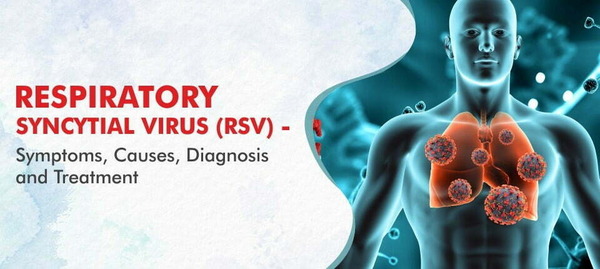Respiratory syncytial virus (RSV), along with the flu are pulmonary perils that are seasonal highly contagious illnesses that adversely affect the respiratory system.
Respiratory syncytial virus (RSV) is a common respiratory virus. Most people are infected by often by the age of 2. RSV is a major contributor to lower respiratory tract infection, such as bronchiolitis and pneumonia. It can also cause upper respiratory tract infections like the common cold. A seasonal virus, RSV typically occurs during the late fall, winter, and early spring months. Common signa and symptoms include a runny nose, cough, fever, wheezing and decrease in appetite.
Respiratory Synctial Virus (RSV)
RSV is primarily spread through respiratory droplets when an infected person coughs or sneezes. These droplets land on surfaces where the survive for several hours. Direct contact with these contaminated surfaces and then touching the nose, mouth or even eyes can cause transmission of the virus. RSV primarily infects the cells lining the respiratory tract, including the nose, throat, bronchioles (small airways), and lungs. The virus can cause inflammation and swelling in these areas, leading to respiratory distress and potential complications.
While Respiratory synctial virus often causes mild cold-like symptoms in healthy adults and older children, in can become serious in high-risk groups. There are several groups of people who are at highest risk for RSV infections.

- Infants and young children: RSV is a leading cause of bronchiolitis and pneumonia in infants under the age of two. Their immature immune system and smaller airways make them susceptible to severe respiratory distress.
- Older adults: RSV can exacerbate conditions like COPD and lead to pneumonia. Most recent estimates for RSV are that it may cause 14,000 deaths per year among U.S. adults over age 65.
- Individuals with compromised immune systems: People with weakened immune systems due to cancer, organ transplants, or HIV/AIDS are more vulnerable to severe RSV infections.
Availability of Vaccines for RSV
In March. 2023, an advisory panel to the US Food and Drug Administration (FDA) recommended approval of RSV vaccine from Pfizer and GSK for older adults, based on their trial data. Both versions of the RSV vaccine were approved for medical use in the United States. In August, 2023, the CDC recommended a new RSV immunization for infants that has been shown to reduce the risk of both RSV-related hospitalization and healthcare visits in infants by about 80 percent.
Influenza (flu) is also a respiratory virus. The flu is a highly contagious respiratory illness caused by influenza viruses that infect the nose, throat and lungs. The flu most commonly causes high fever, body aches, headaches, and fatigue. Flu can lead to pneumonia, worsening of chronic conditions, hospitalization, and even death in severe cases. Like Respiratory syncytial virus, the flu is a droplet that is expelled when an infected person coughs, sneezes, or even talks. The droplet lands on a surface and is spread when one touches that surface, then touches one’s eyes, nose or mouth. Annual flu vaccination helps to prevent infection and is recommended for nearly everyone over six months of age. Side effects from the vaccine are minimal, such as soreness at the injection site and low fever and/or muscle aches.
Preventative Measures
Good preventative measures for both RSV and the flu can help to reduce transmission. Practice good hygiene with frequent handwashing with soap and water, covering coughs and sneezes and avoid touching one’s eyes, nose and mouth. Also consider cleaning and disinfecting frequently touched surfaces to help eliminate any lingering virus particles.
All of the above is for information only, and is not to be taken as medical advice. Please see your medical doctor for formal medical advice.
Barry Schustermann
Follow me on X @BarrySchust
Follow me on Facebook @ Barry Schustermann

